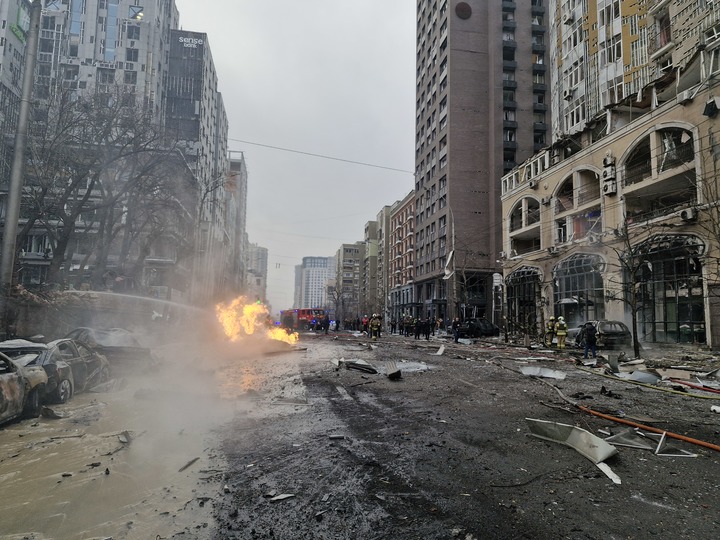
Fire emerges after a Russian missile and drone attack in Kiev, Ukraine, Dec 20, 2024. [Photo/Xinhua]
The Ukraine crisis is a complex interplay of historical, political, economic and social factors, exacerbated by external influences and geopolitical considerations.
Ukraine's strategic location, its historical ties with Russia, and the West's efforts to expand its influence in Eastern Europe have all played a role in triggering the conflict that has now entered its fourth year. Resolving the crisis and establishing a durable European security framework requires not only promoting dialogue between the two sides and upholding international law, but also working diligently and in good faith to address the root causes.
As China's Permanent Representative to the United Nations Fu Cong said ahead of the voting on two General Assembly resolutions on Monday, a binding peace deal should be acceptable to all parties, and Europe should come together to address the root causes of the crisis. "At this critical juncture, we are counting on the international community to create an enabling atmosphere for a political solution to the crisis and for the General Assembly to help forge consensus for peace among Member States," he said.
The UN Security Council also voted on a resolution on the Ukraine crisis later that day. Drafted by the United States, it was the first resolution on Ukraine to be passed by the Security Council since the outbreak of hostilities in 2022, receiving 10 votes in favor and none against, with five abstentions, all from European countries. The resolution was concise, calling for a swift end to the conflict and lasting peace between Ukraine and the Russian Federation.
But it reflects there is a new dynamic at work, as the vote marks the first time that Beijing, Moscow and Washington have been on the same page. This is indicative of a wider consensus between different camps that with both Kyiv and Moscow signaling their willingness to negotiate a peace deal, and the new United States administration intent on acting as a broker in order to secure access to Ukraine's coveted mineral reserves and reset economic and political relations with Russia, a window of opportunity has opened to end the conflict.
Without the change of the US administration and its shift in position on the Ukraine crisis, such a resolution would not have been passed. But it should also be pointed out that the call of the UNSC resolution is exactly what peace-loving countries in the world have been pushing for since the outbreak of the conflict, which is not just a regional conflict but a reflection of broader global tensions, making it one of the most significant geopolitical challenges of the time.
On the same day the UNSC resolution was adopted, President Xi Jinping held a phone conversation with Russian President Vladimir Putin, in which he welcomed the positive efforts made by Russia and relevant parties to resolve the crisis. President Xi also pointed out that soon after the full escalation of the Ukraine crisis, he outlined China's basic position, including four points on what should be done to resolve the crisis, and that China and Brazil, together with other Global South countries, launched the group of Friends for Peace in September with the aim of fostering the right atmosphere and conditions for the political settlement of the crisis.
In fact, Beijing's persistent stance on the Ukraine issue and its commitment to enhancing China-Russia ties have not only made it stand out as an impartial and just voice in the world arena but also lent Moscow support that it badly needed in international organizations, including the UNSC, in the face of the West's previous efforts to portray Russia as an enemy of the entire civilized world.
By insisting on its legitimate right to maintain normal ties with Moscow, Beijing had to endure pressure and criticism from the previous US administration and the Western world at large, which wrongly accused it of enabling Russia's military operations in Ukraine. Hence, it is good to see the US under the newly installed Donald Trump administration make a 180-degree turn in its stance on the Ukraine crisis.
But despite the latest developments, the crisis remains a Gordian knot. China's position on the Ukraine crisis remains consistent and clear; it is committed to building a consensus for ending the conflict and paving the way for peace talks and the establishment of a sustainable security framework in Europe. To that end, it will continue to uphold an objective and fair position and play a constructive role in advancing the political settlement of the crisis.